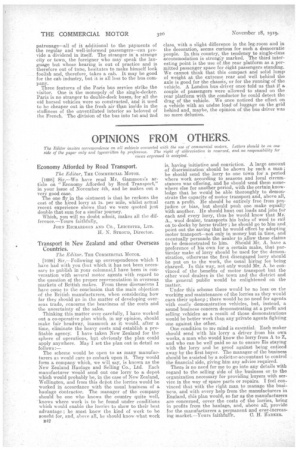OPINIONS FROM OTHERS.
Page 22

If you've noticed an error in this article please click here to report it so we can fix it.
The Editor invites correspondence on all subjects connected with the use of commercial motors. Letters should be on one • side of the paper only and typewritten by preference. The right of abbreviation, is reserved, and no responsibility for views expressed is accepted.
Economy Afforded by Road Transport.
The Editor, THE COMMERCIAL MOTOR.
[1698] Sir,—We have read Mr. Gammons's article on "Economy Afforded by Road Transport," in your issue of November 4th, and he makes out a very good ease.
The one fly in the ointment is that he reckons the cost of the hired lorry at is. per mile, whilst actual recent experience shows that we were quoted just double that sum for a• similar journey. Which, you will no doubt admit, makes all the difference.—Yours faithfully, JOHN RICHARDaIN AND CO., LEIC'ESTEE, LTD.
H.N. STROUD, Director.
Transport in New Zealand and other Overseas Countries.
The Editor. TETE COMMERCIAL MOTOR [1699] Sir,—Following up correspondence which I have had with you (but which it has not been necessary to publish in your columns),I have been in conversation with several motor agents with regard to the question of the proper representation in overseas Markets of British makes. From these discussions I have come to the conclusion that the main objection of the British manufacturers, when considering how far they should go in the matter of developing overseas trade, concerns the heaviness -of the costs and the uncertainty of the sates.
Thinking this matter over carefully, I have worked out a co-operative plan which, in my opinion, should make fair headway, inasmuch as it would, after a time, eliminate the heavy costs and 'establish a profitable agency. I have taken New Zealand for the sphere of operations, but obviously the plan • could apply anywhere. May I set the plan out in detail as follows:— The scheme would be open to as many manufacturers as would care to embark upon it. They would form a company which, we will say, is known as the New Zealand Haulage and Selling Co., Ltd. Each manufacturer would send out one lorry to a. depot which would probably be, in the case of New Zealand, Wellington, and from this dePot the lorries would be worked in accordance with the usual business of a, haulage Contractor. The manager of the company should be one who knows the country quite well, knows where work is to be found under conditions which would enable the lorries. to show to their best advantage; he must know the. kind of work to be sought for, and, above all, he should know what work B42 is, having initiative and conviction. A large amount of discrimination should be shown by such a man ; he should send the lorry to one town for a period where work according to seasons and local circumstances was offering, and he should send them somewhere else for another period, with the certain knowledge that he would be able thoroughly to demonstrate the capacity of motor transport and, above all, earn a profit. He should be entirely free from prejudice or bias, but should push one make equally' with another.. He should hunt out loads and jobs fat. each and every lorry, thus he would know that Mr. A., wool dealer, transports his bales of wool to rail on to docks by horse trolley ; he should go to him and point out the saving that he would effect, by adopting motor transport—not only in money but in time and eventually persuade the dealer to allow these claims to be demonstrated to him. Sluiuld Mr. A. have a preference of his own for a certain make, that particular make of lorry should be used for the demonstration, otherwise the first disengaged lorry should be put on to the work, the usual hiring fee being charged. In this way, not only would Mr. A. be -convinced of the benefits of motor transport but the other wool dealers in the town and the district and the general public would be enlightened on the matter.
Under this scheme there would be no loss on the working and maintenance of the lorries as they would .earn their upkeep ; there would be no need for agents with costly demonstration vehicles, but, instead, a sound business concern demonstrating at a profit and, selling vehicles as a result of those demonstrations would be better work than any private agents fighting one against the other.
One condition to my mind is essential. Each maker should send with his lorry a driver from his own works, a man who would know the lorry from A to Z, and who can be well paid so as to ensure His staying with the lorry and be proof against being enticed away by the first buyer. The manager of the business should be assisted by a solicitor-accountant to control the financial side, giving him any advice required. There is no need for me to go into any details with regard to the selling side of the business or to the organization necessary for providing buyers with service in the way of spare parts or repairs. I feel convinced that with the right man to manage the business, and with every help from the manufacturers in England, this plan would, so far as the manufacturers are concerned, cover the costs of the lorries, bring in profits from the haulage, and, above all, provide for the manufacturers a permanent and ever-increas ing market. —Yours faithfulry, C. II. IcsarkEtt.




























